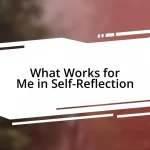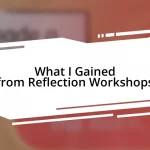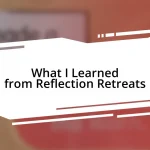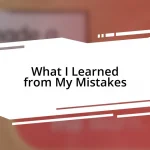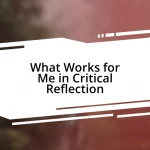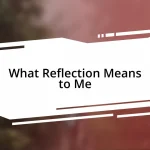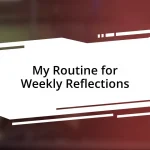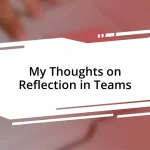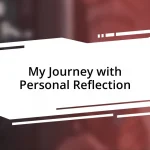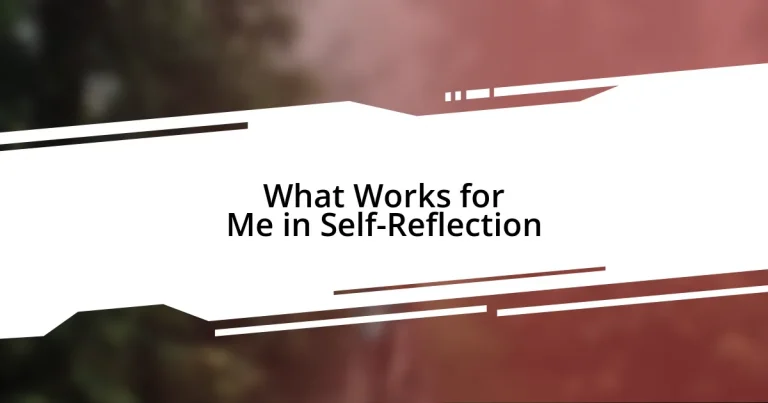Key takeaways:
- Self-reflection clarifies thoughts and feelings, enhances personal growth, and fosters resilience by managing stress.
- Establishing a reflection routine and using prompts can deepen the reflection process, promoting self-awareness and growth.
- Seeking feedback from others can provide valuable external perspectives, enhancing self-awareness and fostering connections.
- Overcoming barriers like distractions, fear of discomfort, and perfectionism is essential for authentic self-reflection and personal development.
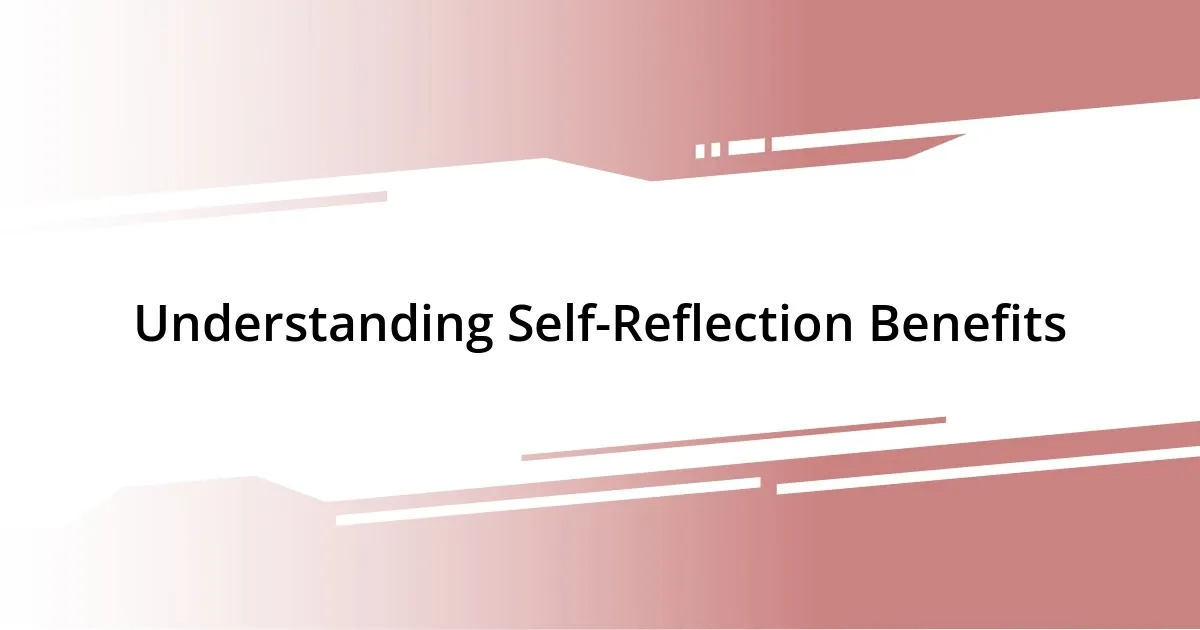
Understanding Self-Reflection Benefits
Self-reflection has a remarkable way of clarifying my thoughts and feelings. For instance, after a particularly heated argument with a friend, I took time to dissect what happened. I realized that I was not only upset by the situation but also by my own reactions. This led to a breakthrough—understanding the role of my emotions in conflicts truly shifted my perspective. Have you ever considered how your feelings shape your interactions?
Furthermore, one of the significant benefits of self-reflection is its power to enhance personal growth. I remember journaling about my goals and noticed a pattern—I often hesitated when faced with new challenges. That self-awareness pushed me to tackle one of my fears, like speaking in public. The result? A newfound confidence I hadn’t anticipated. Reflecting on past choices creates a roadmap for better decision-making. Isn’t it fascinating how examining our past can illuminate our path forward?
Finally, engaging in self-reflection fosters resilience by helping me manage stress. There’s something therapeutic about taking a step back and assessing what I can learn from my experiences, whether they’re triumphs or failures. When I faced setbacks at work, I’d ask myself what lessons were hidden in those moments. This practice not only soothed my anxiety but also equipped me with a stronger mindset for future challenges. How has self-reflection helped you navigate your own obstacles?
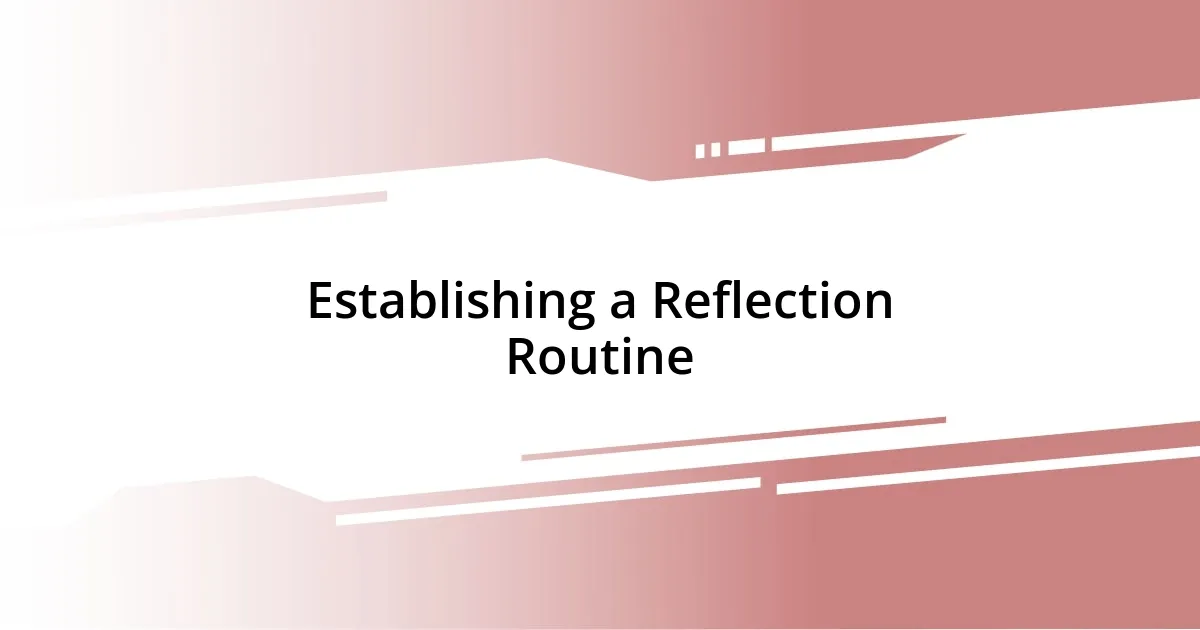
Establishing a Reflection Routine
Establishing a consistent reflection routine can be transformative. I’ve found that setting aside a specific time each day, even if it’s just 10 minutes, creates a space for my thoughts to surface. This small commitment has turned into an essential part of my daily self-care, allowing me to reconnect with my feelings and thoughts more effectively.
It’s also crucial to choose a method of reflection that resonates with you. Whether it’s journaling, meditating, or simply taking a walk to think things through, finding what works best is key. I once tried an app that guided my reflection but ultimately preferred the tactile experience of writing in my journal. The process of putting pen to paper feels more intimate, enhancing my connection to the insights I uncover.
Lastly, I encourage integrating prompts into your routine to steer your reflections. For example, I’d ask myself questions like, “What am I grateful for today?” or “What challenged me this week?” These prompts not only prompt deeper thinking but also build a habit that engages my mind and heart simultaneously. By making reflection purposeful, I can measure my growth and identify areas for improvement with clarity and intent.
| Method of Reflection | Personal Experience |
|---|---|
| Journaling | Writing helps me process emotions. |
| Guided Meditation | Initially used an app, but found it less impactful. |
| Walking in Nature | Physical movement enhances my thought clarity. |
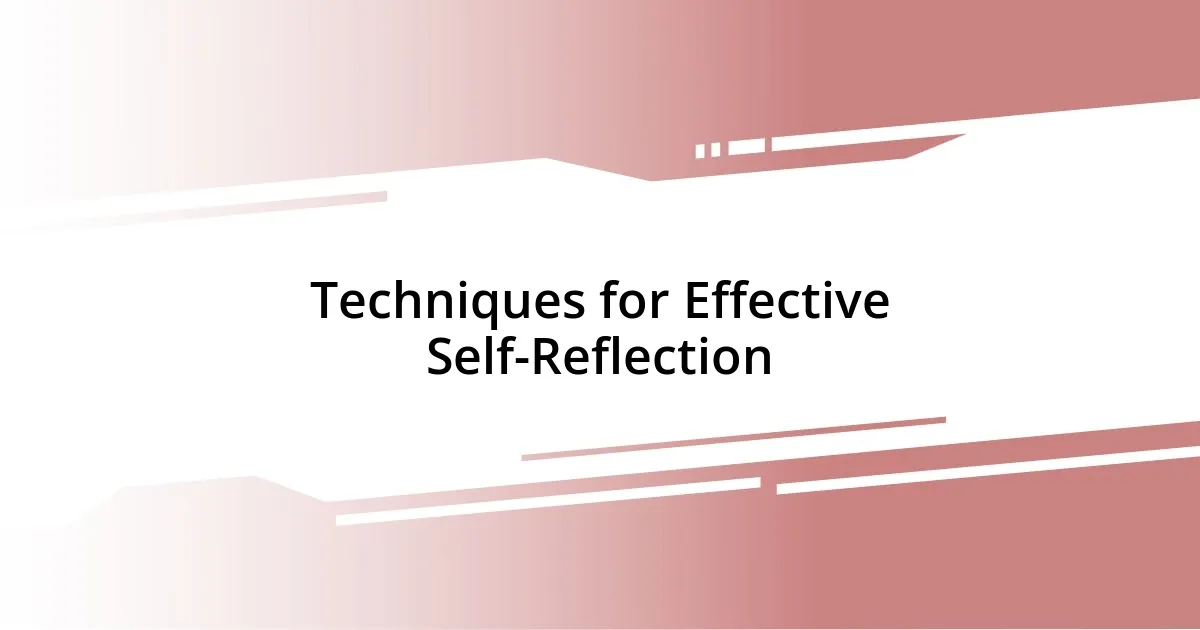
Techniques for Effective Self-Reflection
Practicing mindful self-reflection is a game changer. During one particularly chaotic week, I found myself overwhelmed, juggling responsibilities. It was then I realized that dedicating a few minutes to deep breathing before reflecting allowed me to clear the mental clutter. This simple act of grounding myself opened up a more honest dialogue with my thoughts, leading to insights I might have missed otherwise.
To help you embark on your own self-reflection journey, consider these techniques:
- Mindfulness Meditation: Take a moment to breathe deeply. Focus on your breath to quiet your mind.
- Active Journaling: Rather than just writing about the day, ask yourself thought-provoking questions and free-write your answers.
- Visual Reflection: Sketching or doodling thoughts can spark creativity and help articulate feelings that words sometimes struggle to capture.
- Guided Self-Reflection: Utilize resources like podcasts or apps that lead you through reflective questions and exercises tailored to your experiences.
By incorporating these techniques, I’ve noticed that I not only understand my emotions better, but I also feel more centered. It’s as if each reflection session adds a new layer of clarity to my thoughts, guiding me toward healthier choices. Have you ever experienced a moment when a small technique led to a big realization?

Journaling for Deeper Insights
Journaling has become my trusted companion in the quest for deeper insights. There’s something truly cathartic about pouring my thoughts onto the page. One rainy afternoon, I found myself reflecting on a challenging conversation I had with a friend. As I wrote through my feelings of frustration and confusion, I noticed layers of my emotions peeling away, revealing a longing for honesty and connection. It struck me that sometimes, writing isn’t just about venting; it’s about uncovering truths that I might not acknowledge in the hustle of everyday life.
When journaling, I often create a dialogue between my current self and my past experiences. During a particularly tough week, I revisited entries where I documented my fears and triumphs. I was surprised to see patterns emerge—moments when I felt vulnerable often shifted into opportunities for growth. I wonder, have you ever looked back at your writing and realized it was a conversation with your own self that you didn’t even know you needed? It’s in these moments that journaling transforms from a simple habit into a profound tool for self-discovery.
Incorporating prompts has taken my journaling practice to another level. Recently, I started asking myself, “What limiting beliefs did I confront today?” This simple question opened a floodgate of reflection. I unearthed old fears that had been quietly dictating my decisions, whispering doubts in my ear. Just the act of acknowledging these beliefs felt liberating. It reminded me that the deeper I’m willing to dig in my writing, the clearer my path becomes. Exploring these insights isn’t just an exercise; it’s a pivotal step toward self-growth and authenticity. What revelations might you uncover by embracing a similar approach?
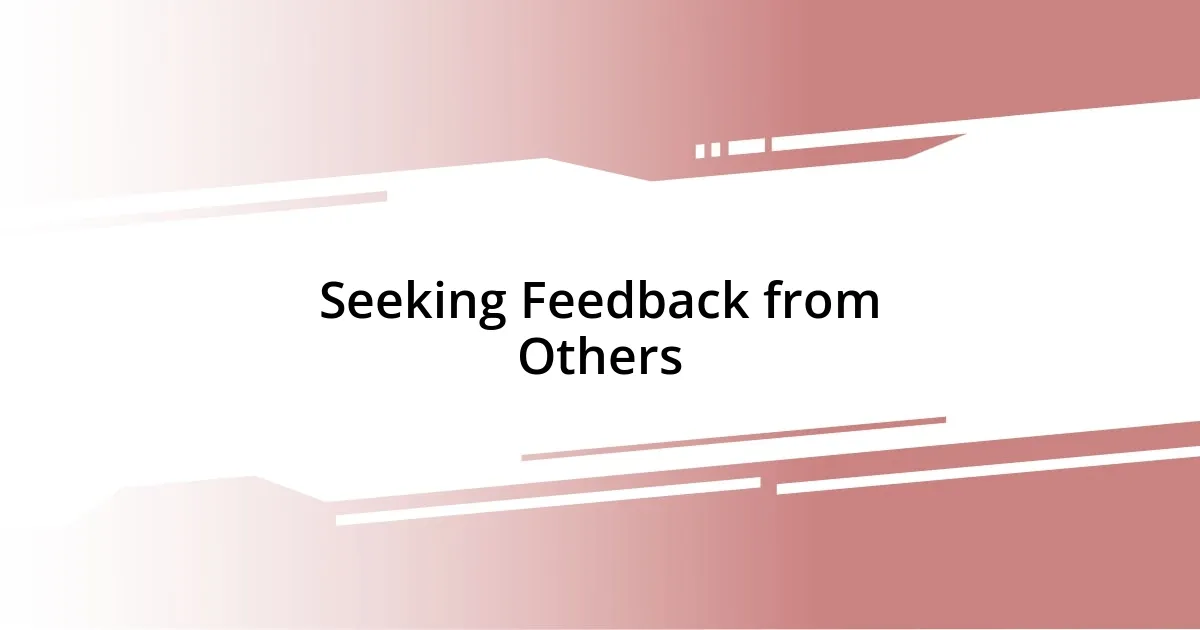
Seeking Feedback from Others
Seeking feedback from others can be a powerful catalyst for self-reflection. I remember a time when I asked a close friend for their thoughts on my communication style. Their candid observations left me feeling exposed yet enlightened. It’s fascinating how an external perspective allows us to see aspects of ourselves that we might overlook in our self-assessment. Have you ever considered how someone’s honest opinion could illuminate a blind spot in your self-awareness?
Another enriching experience for me was participating in a group feedback session at work. Listening to others reflect on my contributions opened up new avenues for growth. One colleague mentioned how my tendency to interrupt during discussions hindered collaboration. Rather than feeling defensive, I appreciated their insight—it sparked a realization about my desire to be heard versus truly listening to others. Have you had moments where feedback reshaped your perspective in unexpected ways?
Finally, I find that seeking feedback isn’t just about improvement; it often fosters connection. Recently, I reached out to a mentor and asked how I can enhance my leadership skills. Their thoughtful response not only provided actionable tips but also deepened our relationship, reinforcing the idea that vulnerability in seeking feedback can create meaningful bonds. Isn’t it incredible how a simple request can lead to both personal growth and stronger connections with those around us?
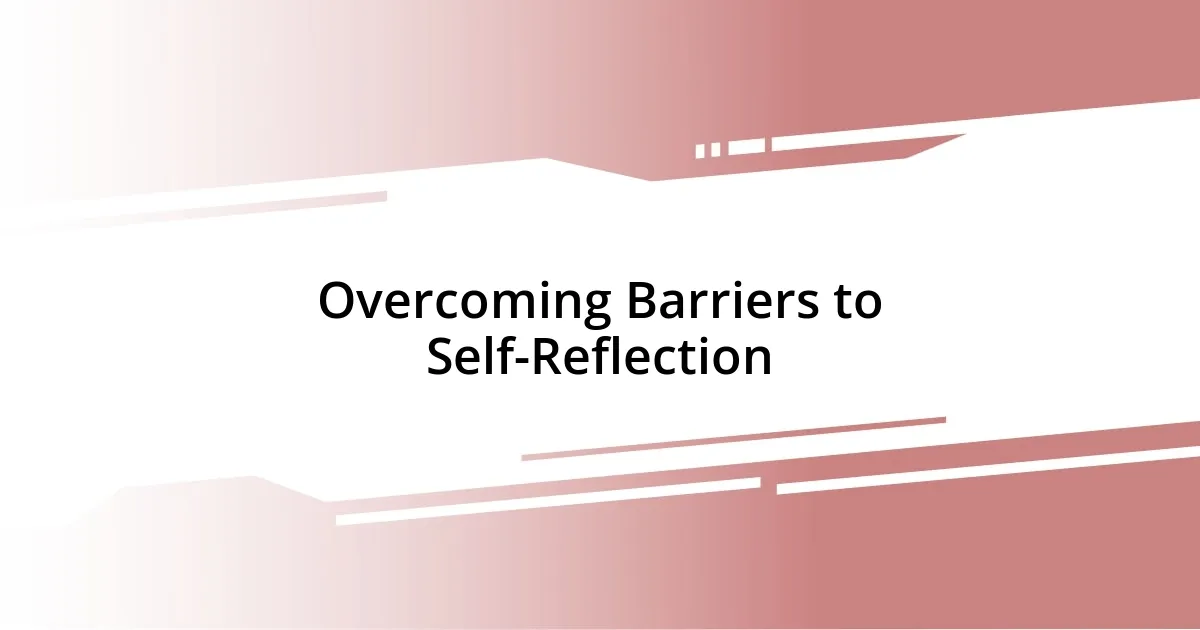
Overcoming Barriers to Self-Reflection
Barriers to self-reflection often lurk in the shadows of our busy lives. I vividly recall a period when I found myself perpetually distracted by work and social obligations. I realized I was denying myself the quiet moments necessary for genuine reflection. Have you ever felt so consumed by life that pausing seemed like a luxury rather than a necessity? Recognizing this pattern was the first step for me, as I began deliberately carving out time—sometimes just 10 minutes—to sit in stillness and simply think.
Another common hurdle is the fear of facing uncomfortable truths. I distinctly remember avoiding reflection after a significant relationship ended, feeling unprepared to confront the emotions swirling within me. However, once I summoned the courage to explore my feelings through writing, I was surprised to discover clarity nestled within the chaos. This process reminded me that discomfort often signifies growth, urging me to embrace honest introspection instead of shying away from it. What fears have kept you from delving deeper into your own experiences?
Lastly, I think about the role of perfectionism as an impediment to authentic self-reflection. There was a time when I hesitated to journal because I wanted every entry to be insightful or profound. It hit me one afternoon, surrounded by crumpled pages, that my reflections didn’t have to be polished. The messiness of my thoughts was part of the journey. Have you experienced that same worry, thinking your insights have to be perfectly articulated? I found that the more I embraced imperfection, the more liberated I felt to explore my thoughts freely—leading to some of my most enlightening realizations.
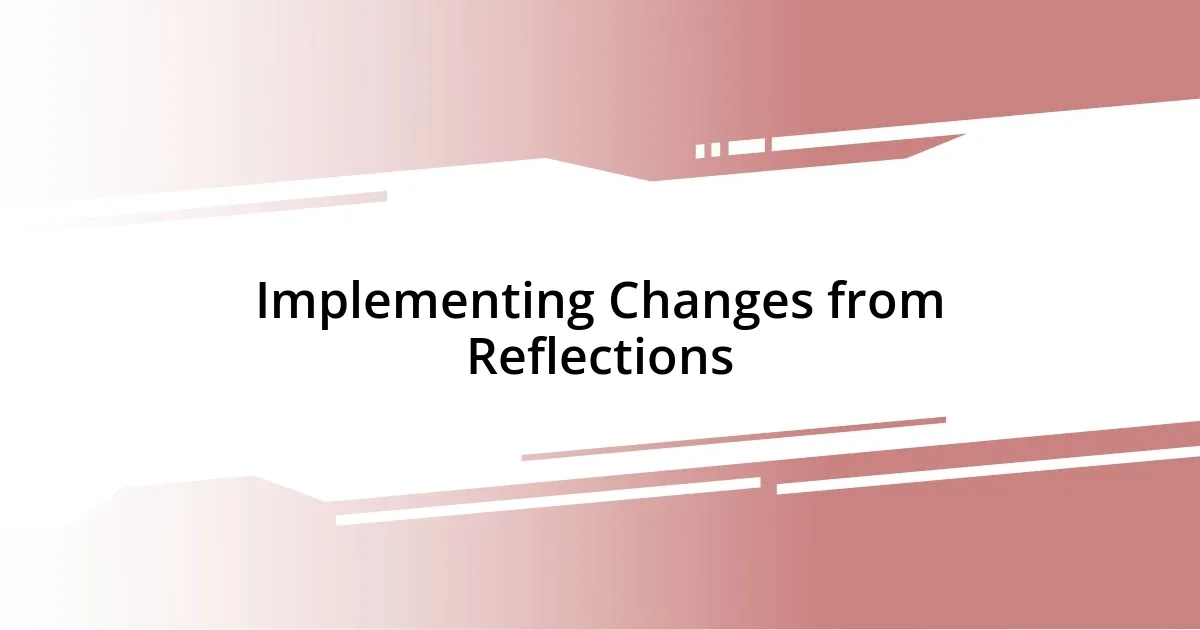
Implementing Changes from Reflections
Implementing changes from self-reflection isn’t always straightforward, but I’ve discovered that small, intentional steps can make a significant impact. For instance, after realizing I often procrastinated on projects, I chose to break tasks into manageable parts. This newfound approach not only reduced my anxiety but also reignited my motivation. Have you ever found that simplifying a daunting task made it feel achievable?
Sometimes, the changes I implement stem from deeper emotional insights. I remember a time when I recognized that my tendency to avoid confrontation was causing unnecessary tension in a friendship. Through reflection, I realized that discussing issues openly would lead to healthier communication. By initiating those honest conversations, I not only strengthened our bond but also built my confidence in navigating tough discussions. I wonder if you’ve ever experienced a moment where facing the truth transformed your relationships?
Finally, I believe that celebrating progress is essential in the implementation process. Recently, after committing to regular exercise following reflections on my well-being, I decided to reward myself with a small treat after each milestone. Even something as simple as enjoying a favorite book or indulging in a special dessert made the journey feel rewarding. Have you thought about how acknowledging your achievements, no matter how small, could motivate you to continue implementing changes in your life?

